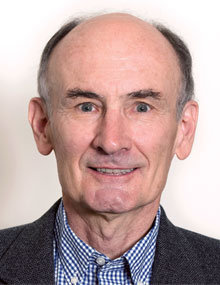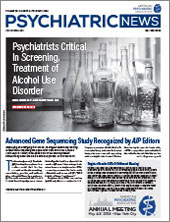Physically healthy children and adolescents aged 5 to 17 years who begin taking second-generation antipsychotics such as aripiprazole, olanzapine, or risperidone for conditions that do not involve psychosis appear to be at no greater risk of death than those initiating other psychiatric medications, according to a
study in
JAMA Psychiatry. However, young adults aged 18 to 24 years who took high doses of antipsychotics (greater than 100 mg chlorpromazine equivalents) had an increased risk of death.
“The findings emphasize the importance of following existing guidelines: use other therapeutic approaches when possible, including those that are nonpharmacological; carefully evaluate patients before initiating treatment; use the lowest effective dose; and monitor during treatment,” lead author Wayne A. Ray, Ph.D., a professor of health policy at Vanderbilt University School of Medicine, told Psychiatric News.
Ray and colleagues used the Medicaid Analytic Extract, a national repository of data from Medicaid and the Children’s Health Insurance Program, to identify all individuals aged 5 to 24 without psychosis who initiated antipsychotic treatment between January 2004 and September 2013. Individuals diagnosed with a serious medical illness in the past year were excluded from the analysis. The researchers divided these patients into low- and high-dose antipsychotic groups, using 100 mg daily of chlorpromazine or its equivalent as the cutoff.
The researchers also identified a control group of similarly aged patients who began taking alternatives to antipsychotics for such conditions as attention-deficit/hyperactivity disorder, depression, or disruptive behaviors, including antidepressants or lithium. A total of 2,067,507 children and young adults who filled nearly 22 million prescriptions (about 8.3 million antipsychotic prescriptions and 13.5 million control prescriptions) were included in the analysis.
Overall, the researchers found that patients in the study who took doses up to 100 mg chlorpromazine equivalents a day were no more likely to die than those who took control medications; however, those who took high-dose antipsychotics had a 37% increased risk of death compared with those who took the control medications. Those who took more than 100 mg chlorpromazine equivalents per day had a 57% increased risk of dying either by overdose or by nonoverdose unintentional injury. However, taking a dose of more than 100 mg chlorpromazine equivalents a day was not associated with nonoverdose suicide deaths, cardiovascular or metabolic deaths, or deaths from other causes.
“A novel contribution of our study is that health care professionals might be more cautious about initiating antipsychotic treatment in patients taking opioids or benzodiazepines or with substance use disorder, as this group is highly vulnerable to overdose death,” Ray said.
When breaking down the data by age groups, Ray and colleagues found no increased risk of death among 5- to 17-year-olds taking high-dose antipsychotics. Eighteen- to 24-year-olds taking high-dose antipsychotics had a 68% increased risk of death overall.
Ray said that the research was prompted by both the number of youth who take antipsychotic medications—roughly 1.3 million as of 2010—and the known risk of adverse events in adults who take antipsychotic medications, such as weight gain and other metabolic effects; prolongation of the QT-interval, which could increase arrhythmia-related deaths; and respiratory-sedative effects, which could increase the risk of overdose, particularly in combination with opioids.
“Although death is very infrequent in children and youth, we wondered about the consequences of widespread antipsychotics in this population,” Ray said. “Several of our group conducted a study in Tennessee that had the provocative finding of increased risk of overdose and cardiovascular deaths in patients 5 to 24 years of age. However, there were several limitations, particularly the inclusion of the first-generation antipsychotics, the generalizability of the experience in a single state, and small numbers of deaths.”
Ray summarized the major takeaways from the study as follows: “No increased risk for children younger than 18 years old and for doses up to 100 mg chlorpromazine equivalents, no increased risk for cardiovascular deaths, and an increased risk of overdose deaths.”
This study was funded by the National Institute for Child Health and Human Development. ■

